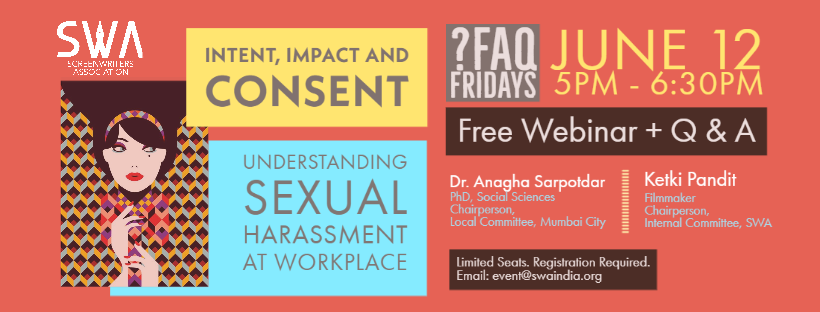@swaindiaorg
#SWA #MeToo #SexualHarassment #Workplace

Yes, it does apply. Especially now, the home is a workplace and is applied there too. Online harassment or over the phone harassment is also covered in the law.
AS: Defined clearly in the law. This law is progressive and includes a lot of things. For example, spreading rumours about a woman is also included.
1) Physically touching
2) Demanding or request of sexual favours.
4) Physical, verbal and non-verbal. Non-verbal harassment is staring or "ghoorna". Dekhne mein aur ghoorne mein difference hain, between looking and staring.
AS: No. I want to say that the aim of the law is not to do moral policing. It's for those women who find some sexual behaviour unacceptable.
Ketaki: Giving a compliment is a tricky one. A lot of men have asked this, how does a man know what is a compliment?
AS: The language you're using is important here. If we are using the word sexy or hot...
AS: It takes a lot of courage to complain at the workplace because it's connected to your livelihood.
AS: Complain immediately. Most of the cases are escalating. If you feel something is wrong early, raise a voice. Don't wait for it to go to a point where your livelihood is in danger.
We should make notes when it happened. Share that with our colleagues. That then becomes evidence.
AS: I had a case where the reporting manager told the complainant that she has to sleep with the client. When the boss called her, she put on the call recorder and recorded the conversation.
Can you physically retaliate?
No, you shouldn't. I would never recommend violence. In fact, if the complainant hits him, the respondent will go to the police station and register a complaint.
Can you register complaints many years later?
No, that is not provided in the law. If you take a 10 year old complaint, it's very difficult.
AS: They have a provision of 3 more months. If the complainant was suffering psychologically, then encouraged by that, they complain.
AS: You have to verbally say what the written complaint was. The respondent is called. It's like a court in that way.
AS: You have to complete it in 90 days. The committee will recommend it to the employer and they will take action.
What if there is no action?
Complainant can always approach the outside court. They have a copy of the report.
AS: The responsibility is with the employer. Two things:
1) Mentality or attitude change is important. It's not about do's and don'ts. We are not school kids. Awareness about gender is most important. It's all related to gender.
AS: I want to say that most policies in big organizations are open to men and women when it comes to complaining. You can complain under code of conduct.
AS: It's all to do with the mindset, the patriarchal mindset. It's the male supremacist tendency. It also could be a certain kind of workplace culture. What is the status of gender diversity at the workplace? Could be the nature of work.
AS: Very tough. Maybe police or local committees. Depends on the situation. Some kind of forum like SWA.


